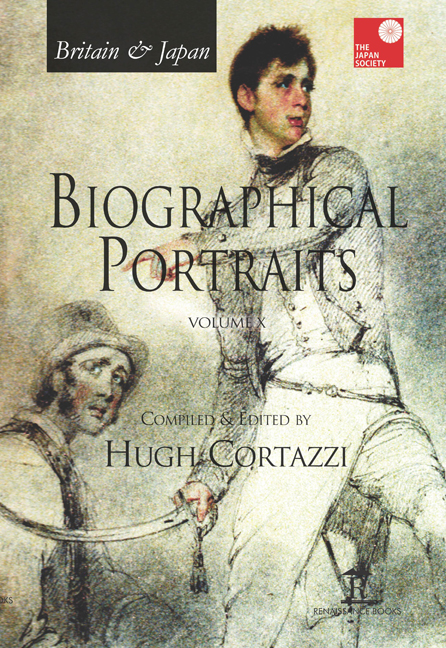Book contents
- Frontmatter
- Dedication
- Contents
- Introduction
- List of Contributors
- Index of Biographical Portraits in Japan Society Volumes
- PART I BRITAIN IN JAPAN
- PART II JAPAN IN BRITAIN
- Select Bibliography of Works in English on Anglo-Japanese Relations [Compiled by Gill Goddard – Retired East Asian Studies Librarian, University of Sheffield]
- Select Bibliography of Works in Japanese on Anglo-Japanese Relations [Compiled by Akira Hirano, SISJAC]
- Index
36 - Christopher W. McDonald (1931–2011): A Life in Japan
Published online by Cambridge University Press: 07 May 2022
- Frontmatter
- Dedication
- Contents
- Introduction
- List of Contributors
- Index of Biographical Portraits in Japan Society Volumes
- PART I BRITAIN IN JAPAN
- PART II JAPAN IN BRITAIN
- Select Bibliography of Works in English on Anglo-Japanese Relations [Compiled by Gill Goddard – Retired East Asian Studies Librarian, University of Sheffield]
- Select Bibliography of Works in Japanese on Anglo-Japanese Relations [Compiled by Akira Hirano, SISJAC]
- Index
Summary
CHRISTOPHER (BETTER KNOWN as Chris) McDonald (or ‘Mac-san’) passed away on 2 December 2011, just days short of his eightieth birthday. He spent nearly sixty-two years, substantially all of his adult life, in Japan, witnessing at first hand the country's transformation after the devastation of the Second World War in to a global growth engine and then into a mature economy and society. Described by one friend as if he had ‘stepped out of central casting to play the British ambassador: tall and distinguished; handsome and urbane; witty and intelligent; astonishingly well-connected’, McDonald's life encompassed a wide and varied range of high-profile activities, as a businessman, sportsman, sumo patron, music lover, charity worker and socialite.
EARLY LIFE
McDonald was born in Harrow, northwest London, to parents Albert William and Emily on 13 December 1931 and attended London County Grammar School and Kilburn Polytechnic. Albert was a ‘typical middle class working man’. Coincidence led to McDonald’s journey to Japan. Upon leaving school in 1949, he and his best friend were recommnded by their headmaster to apply for two vacancies available at the overseas headquarters of National Cash Register Company (now NCR Corporation) in London. ‘One [of the positions] was in the Accounts Department; the other in the Overseas Department. When we arrived for interview we were shown into a waiting room and eventually the Personnel Manager arrived and said “Who's first?” My friend happened to be sitting nearer the door, so he was interviewed first – by the Accounting Manager. A few minutes later I was called to be interviewed – by the Overseas Manager.’ Several months into his job, McDonald was spotted by George Haynes, NCR's Far Eastern Director, who asked whether he would be interested in assisting him in re-establishing the business in Japan.
The idea of going to a far-away land had considerable appeal to McDonald, who had been interested in travel and geography from a young age. That evening he managed to persuade his parents, whose elder son Leslie had fought with the British 14th Army in Burma in combat against the Japanese, to give their consent and accepted the offer the following morning. The assignment had an additional benefit; McDonald was expecting to be called up for National Service soon but left Britain on 24 March 1950, just three days before the papers arrived.
- Type
- Chapter
- Information
- Britain & Japan Biographical Portraits Vol X , pp. 399 - 407Publisher: Amsterdam University PressPrint publication year: 2016

